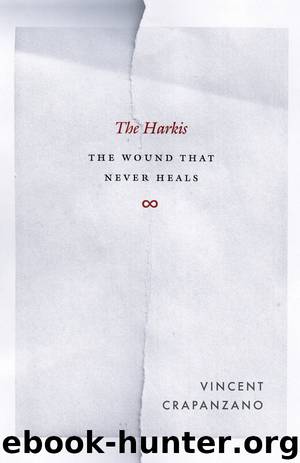The Harkis: The Wound That Never Heals by Vincent Crapanzano

Author:Vincent Crapanzano
Language: eng
Format: epub
Publisher: The University of Chicago Press
Published: 2011-11-17T05:00:00+00:00
SIX
After the Camps
The Harkis are kept in the position of the colonized—of little Muslims from the Algerian départements. This policy was carried out in a deliberate and knowing manner by successive governments. The Harkis were willingly prevented from developing, constrained by internment, and [forced to turn] in on themselves. From time to time, a little measure for improving their lot was taken. All the political parties have engaged in a game of clientelism, soliciting the Harkis at election time.
—Abdelkrim Kletch, undated press release (2006?) from the Collectif national justice pour les Harkis
“During the summer of ’91, I became a spokesman for the children of the Harkis,” Hacène Arfi told me as we were discussing Harki protests in the office of Coordination Harka Saint-Laurent-des-Arbres, which he had founded. The walls of the office were covered with photographs and newspaper clippings about Harki demands and protests for recognition and compensation, in many of which Hacène had participated. The office was next to a small mosque to which the old Harkis went to pray several times each day.
Hacène continued:
I helped organize the protests. We broke the wall of silence [surrounding the Harkis]. We had nothing to lose. Our lives had been fucked up. That was clear. It was thanks to this violence—unfortunately it had to be so—that after thirty years the Harkis could finally emerge from the oblivion in which they had been living. The French now had to recognize the Harki problem—their situation. The press—the international press had been alerted. We received journalists from Switzerland, Holland, Belgium, Turkey, and the Americans. It all started here.
“I thought the protests had begun in Narbonne that summer,” I said. “That’s what everyone told me there.” “No, no,” Hacène responded. “It started here and then spread to Narbonne. I have the press reports in the archives. I’ll show you later.”
He did show me them later. They seem to confirm his story:
One year earlier I was focusing on the Harkis in Marseilles. I was a forestry guard. I received a letter naming me, according to the election roles, a juror for the cours d’assizes. Eight months later I received a second letter that said that I had to report to the Palais de Justice in Aix-en-Provence on March 19, 1990. I received the letter at noon. It was a boom in my head. March 19. The day the war ended. The day our slaughter began. How could they?
The day before, as we were working, we came on an old minefield from World War II. We called the authorities, but before they came I was able to squirrel away three grenades. They were unusable because they had rusty pins. I don’t know why I took them. I had to work on the afternoon I received the call to jury duty. It was as though another bomb had exploded in my head. I decided that, instead of appearing at the Palais de Justice, I, the son of a Harki, would show the French. I already had the idea of what I was going to do six months earlier.
Download
This site does not store any files on its server. We only index and link to content provided by other sites. Please contact the content providers to delete copyright contents if any and email us, we'll remove relevant links or contents immediately.
| Anthropology | Archaeology |
| Philosophy | Politics & Government |
| Social Sciences | Sociology |
| Women's Studies |
The Leavers by Lisa Ko(6472)
Born to Run: by Christopher McDougall(6260)
iGen by Jean M. Twenge(4702)
Sapiens by Yuval Noah Harari(4537)
The Kite Runner by Khaled Hosseini(4433)
Spare by Prince Harry The Duke of Sussex(4195)
Bullshit Jobs by David Graeber(3179)
Livewired by David Eagleman(3121)
Goodbye Paradise(2962)
Never by Ken Follett(2880)
A Dictionary of Sociology by Unknown(2518)
Harry Potter 4 - Harry Potter and The Goblet of Fire by J.K.Rowling(2416)
The Club by A.L. Brooks(2360)
People of the Earth: An Introduction to World Prehistory by Dr. Brian Fagan & Nadia Durrani(2346)
The Social Psychology of Inequality by Unknown(2310)
Machine Learning at Scale with H2O by Gregory Keys | David Whiting(2289)
Harry Potter and the Order of the Phoenix (5) by J.K. Rowling(2227)
0041152001443424520 .pdf by Unknown(2220)
Don't Sleep, There Are Snakes by Daniel L. Everett(2216)
